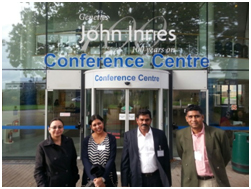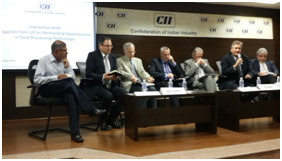19th January 2015 New Delhi, India
Food systems – UK, India – from field to plate
The intricate world of supply chains of several foods from field to plate and the relationships between food, health and environment gets all the more fascinating if one does a comparative analysis of two countries’ food systems. This is what we attempted to do during the final quarter of the previous year with two scoping visits, one to UK in November and the other one in India in the following month. We were fortunate to have expert delegates from both the countries involved in these visits to guide us competently. After spending considerable time with them during these visits, I am now more informed of varied ingredients of the food system and multitude of opportunities existing for potential collaborative activities between both the countries.
These visits were a follow-up to a brief visit which was organised by us around CII’s biennial event, ‘Foodpro’ in Chennai. The objective was to secure understanding of the existing landscape in each country and determine potential areas for collaborative activities that were based on synergies between both the countries.
 The week-long visit in November included visit of a three member Indian delegation – Professor Ram Rajasekharan, Director, Central Food Technological Research Institute, Dr Vamsi Krishna Addanki, Department of Biotechnology, Dr Monika Garg, National Agri-Food Biotechnology Institute (NABI) to Norwich and Cambridge. Besides attending BBSRC sponsored international conference, Total Food 2014 as hosted by the Institute of Food Research (IFR), the delegation was provided with opportunities to interact with academics from UK’s world’s leading research centres, the John Innes Centre (JIC), the Institute of Food Research (IFR), The Genome Analysis Centre (TGAC) including tours of their facilities. This was followed by a visit to the National Institute of Agricultural Botany (NIAB) in Cambridge.
The week-long visit in November included visit of a three member Indian delegation – Professor Ram Rajasekharan, Director, Central Food Technological Research Institute, Dr Vamsi Krishna Addanki, Department of Biotechnology, Dr Monika Garg, National Agri-Food Biotechnology Institute (NABI) to Norwich and Cambridge. Besides attending BBSRC sponsored international conference, Total Food 2014 as hosted by the Institute of Food Research (IFR), the delegation was provided with opportunities to interact with academics from UK’s world’s leading research centres, the John Innes Centre (JIC), the Institute of Food Research (IFR), The Genome Analysis Centre (TGAC) including tours of their facilities. This was followed by a visit to the National Institute of Agricultural Botany (NIAB) in Cambridge.
 Did you know that one third to a half of all food produced in the world ends up as waste?! Total Food provided us with quite a good understanding of ongoing efforts to tackle food waste and ways to getting better value from this waste.
Did you know that one third to a half of all food produced in the world ends up as waste?! Total Food provided us with quite a good understanding of ongoing efforts to tackle food waste and ways to getting better value from this waste.
The Indian delegation met with the Director, Professor David Boxer and his colleagues in IFR. The roundtable discussions highlighted plenty of synergies with India around food and health as well as gut health. This interaction coupled with tour of the gut microbiology lab and the bio-refinery made this a memorable visit to IFR. The Indian delegates were also provided with an exhaustive tour of state of the art facilities in TGAC as well as JIC that highlighted some of the cutting edge research around plants and microbes genetics taking place in these institutes. We concluded our trip to UK with a daylong visit to NIAB where we got to meet with research investigators who are part of two ongoing UK-India research projects around legumes and wheat – indeed a brilliant way to end a trip which was aimed at scoping collaborative linkages! An Indian delegate later reported that ‘visit was a good opportunity and a learning experience about latest happenings/know-how in food as well as crop research. More Indo-UK collaborations should be encouraged in this area.’
 Within nearly a fortnight of this visit, I was touring again, this time India with an UK delegation that comprised of Professor Tim Foster, University of Nottingham, Professor Martin Howarth, Sheffield Hallam University, Professor Savvas Tassou, Brunel University, Neil Wilson, Innovate UK, Tim Ingmire, Pepsico UK and Alan Rowe, Rowett Institute of Nutrition and Health. The ‘India Odyssey’ as termed by an UK delegate began with meetings in relevant Government of India’s departments- the Indian Council of Agricultural Research, the Department of Biotechnology (DBT) and the Council of Scientific and Industrial Research (CSIR). These meetings were helpful in providing the delegates with macro perspective of Government’s priorities and informing them about India’s keen interest in partnering with UK in this area. These meetings were followed with site visits to research centres across India which included visits to DBT’s Centre of Innovative and Applied Bioprocessing and National Agri-Food Biotechnology Institute, CSIR’s Institute of Himalayan Bioresource Technology and Central Food Technological Research Institute, Ministry of Food Processing Industries’ Indian Institute of Crop Processing Technology, Tamil Nadu Agricultural University. The site tours were interspersed with meetings with industry representatives in round-tables as organised with CII (Confederation of Indian Industry) in Delhi, Chandigarh and Coimbatore.
Within nearly a fortnight of this visit, I was touring again, this time India with an UK delegation that comprised of Professor Tim Foster, University of Nottingham, Professor Martin Howarth, Sheffield Hallam University, Professor Savvas Tassou, Brunel University, Neil Wilson, Innovate UK, Tim Ingmire, Pepsico UK and Alan Rowe, Rowett Institute of Nutrition and Health. The ‘India Odyssey’ as termed by an UK delegate began with meetings in relevant Government of India’s departments- the Indian Council of Agricultural Research, the Department of Biotechnology (DBT) and the Council of Scientific and Industrial Research (CSIR). These meetings were helpful in providing the delegates with macro perspective of Government’s priorities and informing them about India’s keen interest in partnering with UK in this area. These meetings were followed with site visits to research centres across India which included visits to DBT’s Centre of Innovative and Applied Bioprocessing and National Agri-Food Biotechnology Institute, CSIR’s Institute of Himalayan Bioresource Technology and Central Food Technological Research Institute, Ministry of Food Processing Industries’ Indian Institute of Crop Processing Technology, Tamil Nadu Agricultural University. The site tours were interspersed with meetings with industry representatives in round-tables as organised with CII (Confederation of Indian Industry) in Delhi, Chandigarh and Coimbatore.
 This comprehensive visit was useful in providing the UK delegates with an informed understanding of India’s research landscape, as substantiated by following feedback, ‘……I for one have learnt a lot about the unique position India is in and the challenges and opportunities that it faces. I have come back inspired on a number of fronts.’ ‘I’ve also learnt a great deal about India and I think there are many great opportunities for collaboration and developing pragmatic and effective solutions.’
This comprehensive visit was useful in providing the UK delegates with an informed understanding of India’s research landscape, as substantiated by following feedback, ‘……I for one have learnt a lot about the unique position India is in and the challenges and opportunities that it faces. I have come back inspired on a number of fronts.’ ‘I’ve also learnt a great deal about India and I think there are many great opportunities for collaboration and developing pragmatic and effective solutions.’
The recommendations from these experts will be invaluable to us in planning the next steps. These visits have set the ball rolling! Do watch this space for further new developments in this space.
We have a strong research team working on agriculture related research to build intelligent softcomputing model since 6 years, done some good contributions.
Strongly looking for international research collaborations and funding opportunities to explore more on it.
Regards,
Hareesha KS
Manipal University